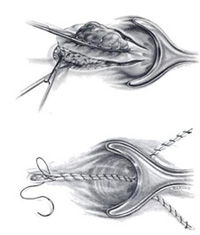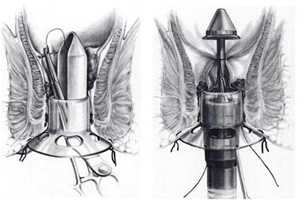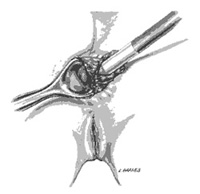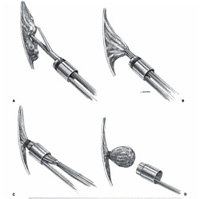There are many approaches to the treatment of hemorrhoids that depend on the location, type, and severity of the hemorrhoid. These are surgical in nature, and, as a result, are associated with pain, post-operative bleeding, and the other possible complications of surgical operations. At the Hemorrhoid Treatment Center of Florida, we treat hemorrhoids using the HET Procedure.
| Treatment Options |
|---|
| Open Surgery |
| Stapled / PPH |
| Cryosurgery, Infrared, and Laser Treatment |
| Rubber Band Ligation |
| HET Treatment |
Open Surgery

Open Surgery Treatment Method
The open surgical approach consists of the ligation of the feeding vessels with sutures and the cutting away of the tissue. Bleeding and pain are the norms. The pain associated with the first postoperative bowel movement has been compared to that of having swallowed a hand grenade with a delayed fuse!
Many variations of the open operation are done, but all involve general anesthesia in the operating room and are associated with the complications of the surgery and anesthesia.
Stapled / PPH Treatment Method

The stapled, or PPH, hemorrhoid procedure has gained popularity and is also a surgical procedure done under anesthesia in the operating room. It is also associated with post-operative pain and bleeding as well as other serious problems that may occur related to the staple placement.
Cryosurgery, Infrared, and Laser

Cryosurgery (pictured), infrared and laser treatment all cause the immediate destruction of tissue and in essence have the same outcome as open surgery. Though not cut away, tissue is destroyed and the resulting open wound needs to heal.
Rubber Band Ligation

Rubber band ligation is the ligation of the tissue in an effort to pinch off the blood supply that results in the death of the tissue. Pulling the hemorrhoid into a small doubled-sleeved cylinder allows the placement of a latex or rubber band around the hemorrhoid. Over time, the lack of blood supply to the tissue causes it to die, and it is eliminated during a bowel movement. The potential drawbacks of this method include the long delay of results, bleeding, pain and ulceration. Also, multiple treatments may be necessary to fully treat the condition.
HET Procedure
The Ultroid® procedure is noninvasive; there is no cutting, freezing, stapling, freezing, burning or sclerosing. There is no post-procedure complication of pain, bleeding, ulceration anal narrowing or infection that is associated with the other methods. The procedure is painless and is associated with no pain afterwards. It requires no anesthesia. It is very effective for grade 1 and 2 and even grade 3 internal hemorrhoids.
- Most hemorrhoids require just one treatment.
- No anesthesia or bowel preparation is required, so the majority of patients are able to resume their daily activities immediately following the procedure.
- However it is ineffective for prolapsing internal hemorrhoids
- The procedure takes just a few minutes, and the procedure is performed in-office, not at a hospital operating room.
- There is no pain or recovery time associated with the procedure.
As a board certified surgeon, Dr. Shapiro is able to treat external hemorrhoids, as well. They arise in an area that cannot be treated with the Ultroid device because, since the hemorrhoids are below the dentate line, they receive pain fibers. The internal hemorrhoids – which can be treated by Ultroid – are above the dentate line where there are no pain fibers. Dr. Shapiro can remove the external hemorrhoids with a gentle local anesthesia and a minor office surgical procedure, providing a total HD solution.
Back to top
Tampa Bay Area Hemorrhoid Treatment | Hemorrhoid Treatment Center of Florida
Hemorrhoidal Disease comes in a variety of forms, and there are many different methods of treatment for different situations. Our physicians are experienced and knowledgeable in the treatment of hemorrhoids, so you can be assured that you will receive the safest, most effective treatment available for you. If you’re experiencing symptoms of Hemorrhoidal Disease in Tampa, Clearwater, or St. Petersburg, contact us today at (727) 724-4279 to speak to a physician and learn what treatment options are available for you.








